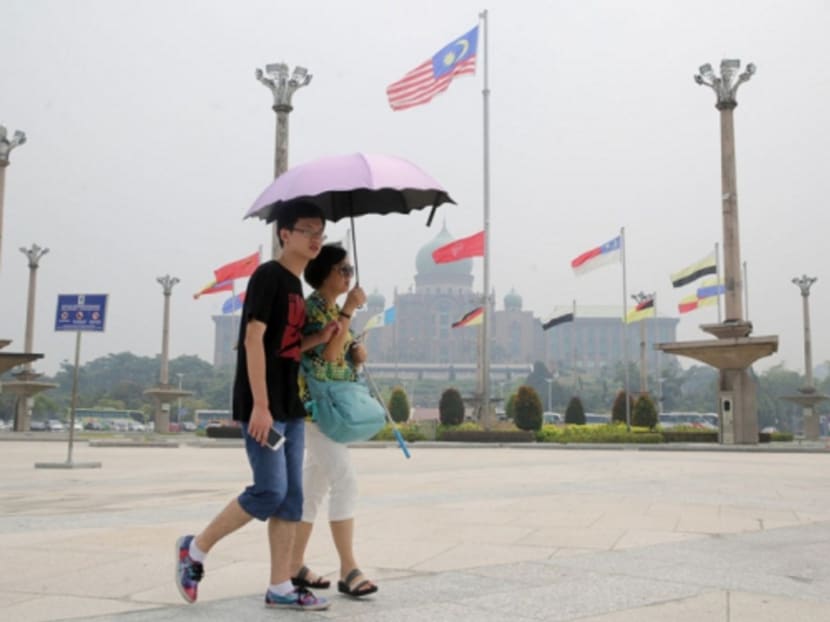Transboundary haze laws ‘may not be best option to tackle errant firms’
KUALA LUMPUR — While Malaysia believes diplomacy can address issues related to transboundary haze, it is far from convinced that transboundary haze legislation is the best option to take action against errant companies that set forest fires, said a federal minister yesterday.

Tourists on a hazy day in Putrajaya yesterday. Transboundary haze suffocated the region in smoke last year, affecting tens of millions of people. Photo: Malay Mail Online
KUALA LUMPUR — While Malaysia believes diplomacy can address issues related to transboundary haze, it is far from convinced that transboundary haze legislation is the best option to take action against errant companies that set forest fires, said a federal minister yesterday.
Natural Resources and Environment Minister Wan Junaidi Tuanku Jaafar said Malaysia had considered using laws similar to Singapore, such as the Republic’s Transboundary Haze Pollution Act (THPA), but their effectiveness remained to be seen.
“This is because the people they (Singapore) want to take action against are in another country, and (under the Act) it can only be done if they are in Singapore itself,” he said.
“The law also does not allow them (Singapore) to nab the culprits unless they get the green light from Indonesia or other neighbouring countries.”
Singapore’s Parliament passed the THPA in 2014, aimed at deterring and prosecuting entities that are responsible for transboundary haze pollution in the city state, whether Singaporean or foreign.
In April this year, Singapore’s Minister for the Environment and Water Resources Masagos Zulkifli had vowed to crack down on those responsible for transboundary haze using the “full extent” of Singapore’s laws.
“We must not let companies and corporations get away with their most egregious acts … The message to everybody, whether you are a Singaporean or a foreigner, (is) if you violate our laws and if our laws allow us to act within the ambit of those laws, we will take the law to its full extent,” he had said.
However, Indonesian Vice-President Jusuf Kalla had said in June that his country would not allow Singapore to prosecute its citizens suspected of causing forest fires that blanketed the region in haze in 2015. His critical remarks on the matter were echoed by the Indonesian Environment and Forestry Minister Siti Nurbaya Bakar as she lashed out at Singapore’s move to question the director of an Indonesian company over the haze.
Singapore’s National Environment Agency (NEA) had announced in May that it had obtained a court warrant against the director after he failed to heed the THPA notice served to him by the NEA when he was in Singapore.
The notice required him to attend an interview with NEA in relation to ongoing investigations, but he failed to turn up.
In response to the two Indonesian leaders’ remarks, Singapore’s Ministry of the Environment and Water Resources (MEWR) had also said in June that Indonesia should welcome Singapore’s transboundary haze laws as an additional tool to curtail irresponsible acts that have caused the haze, which has plagued both Indonesians and others in the region for decades.
It also said the THPA “adds to the collective efforts to hold errant companies accountable for their irresponsible actions”. Additionally, MEWR said the Act was not directed at any individual or company based on nationality and therefore “not an issue of sovereignty or national dignity”.
Stressing diplomacy, Mr Wan Junaidi said yesterday it was important to respect the sovereignty of a country. “I have met with officials from Indonesia to discuss the matter and it has had a positive impact with minimal friction between Malaysia and Indonesia,” he said.
Mr Wan Junaidi also said there were 3,000 Indonesian police and army personnel that were deployed to tackle forest fires caused by smallholders who practise “slash and burn” in their holdings which contributed to the haze.
Transboundary haze caused by widespread fires in Indonesia blanketed the region from September to November last year and affected tens of millions of people.
Last year, the NEA sent notices to six companies directing them to put out fires allegedly contributing to the haze. AGENCIES






